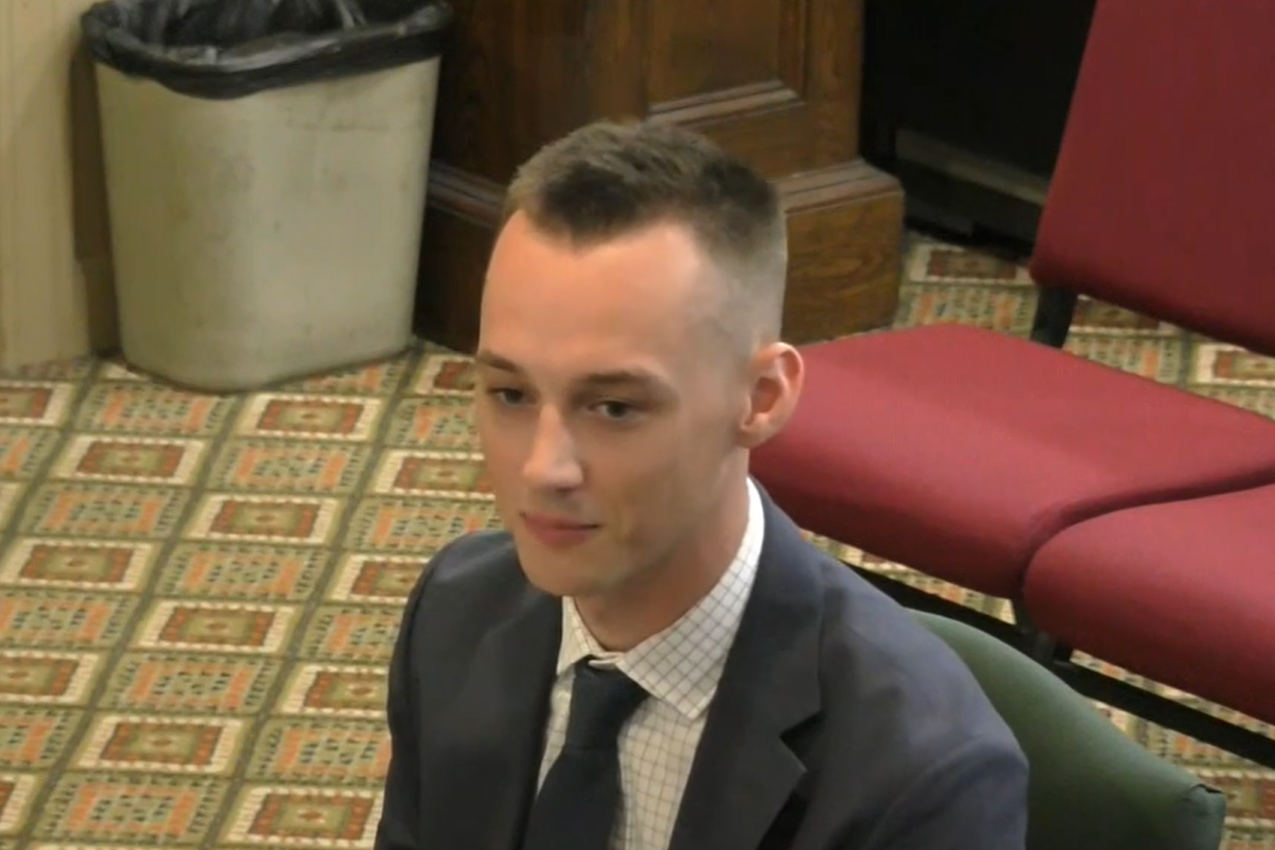Cole Rigney interviews for a job as a Wilbraham Police Officer.
Photo credit: Wilbraham Public Access
WILBRAHAM — At the July 14 Select Board meeting, Cole Rigney was hired as a police officer, but the condensed timeline for the hiring left Select Board member Marc Ducey with “concerns.”
About a month ago, Wilbraham began searching for police department candidates in its usual manner, but Town Administrator Nick Breault explained, “The applicant pool has not been robust in the last few rounds, frankly.”
Usually, the town advertises for a police officer position, applications are received and Police Chief Ed Lennon interviews candidates. Some of those candidates move on to a second round of interviews, including with the town’s human resources coordinator. Candidates who pass a background check are then interviewed by the Select Board, which makes the hiring decision. This process can take up to a month.
The town prefers to hire police academy-trained officers, but it may pay to send otherwise qualified candidates to the academy. Before being enrolled, the person must pass a physical and psychological exam, adding about a week to the process, before entering the five-month academy program.
Breault said that the town had come to the point in the current search where qualified candidates would be interviewed by the Select Board, or the town would restart the process to seek a better applicant pool. However, members of the next police academy class need to be enrolled by July 25, leaving little time for them to undergo the usual interviewing and onboarding.
Lennon approached Breault, explaining that Rigney was a potential candidate who was already employed by the town as an emergency dispatcher for Wilbraham Regional Communications. During Rigney’s interview with the Select Board, he said he “fell in love with public safety” while working as a dispatcher for Chicopee-based WESTCOMM Regional Dispatch. After a brief hiatus from dispatching, he was hired by Wilbraham.
Despite his father being the fire chief in Longmeadow, Rigney said he was drawn toward dispatching police calls. “Every time that 9-1-1 phone rings, I want to jump out of my seat and go help somebody,” Rigney said. He told the board that he is interested in the community policing aspect of municipal law enforcement. He said, “As much as policing has gotten some hatred over the last four or five years, I’d like to be the officer that changes that for those people.”
Select Board Chair Michael Squindo said the interview with Rigney was one of the more extensive that he has participated in. The Wilbraham resident was asked about arresting people he knows, dealing with irate individuals, use of force, the physical rigors of the job, who his role models were and where he saw himself in five years.
After the interview, Ducey said he had concerns about the “compressed timeframe” of the process, although not with Rigney’s qualifications. Ducey said the process “creates a set of standards that the public expects. It creates trust.” While appointing Rigney would save the town a few months it would otherwise go without an officer, he said, it “might be worthwhile to spend those few months.”
Squindo emphasized that all the same steps that are normally used when vetting candidates would be applied to Rigney. Breault said that, if Rigney were hired, it would be contingent upon passing a background check. The physical and psychological tests would be undergone in the two weeks between his being hired and academy enrollment.
Select Board member Susan Bunnell said that over her years on the Select Board, she had seen a decline in the size of police candidate pools and did not feel that delaying the hiring decision would guarantee a wider field of candidates. This gave her “a degree of comfort” in moving forward in hiring Rigney.
Squindo said the board needed to trust in the recommendation of its department heads, in this case, the police chief. Nonetheless, Ducey remained uncomfortable with the shortened process and was the sole “no” vote.



